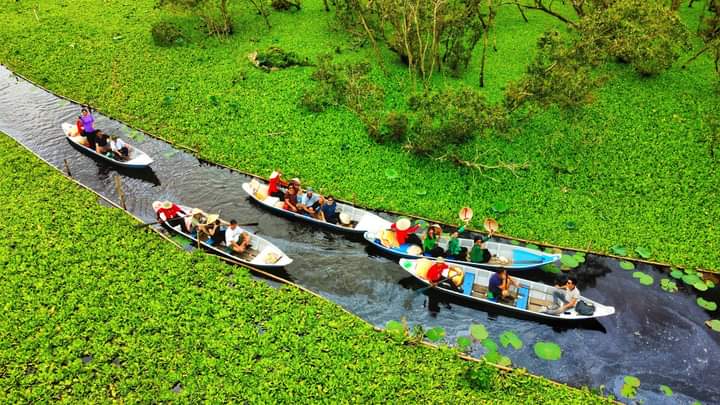Mekong Delta, with its captivating landscapes and unique ecological allure, holds immense potential to emerge as a leading tourism hub in Vietnam. However, despite its abundant offerings, the region continues to lag behind in tourism development. Here are four key reasons contributing to this stagnation, as highlighted by experts:
Lackluster Tourism Products:
The Mekong Delta region still struggles with underdeveloped tourism products. Many localities have yet to invest in crafting unique travel experiences, despite boasting rich resources and untapped potential. Visitors seek authentic experiences and services tailored to the region’s cultural and natural heritage. To attract tourists, businesses must delve into local resources and cultural nuances to create distinctive tourism products.
Inadequate Infrastructure:
Poor transportation infrastructure poses a significant obstacle to tourism growth in the Mekong Delta. The journey from Ho Chi Minh City to the delta’s provinces lacks convenience, with frequent traffic congestions along relatively short distances. This logistical challenge discourages travelers and hampers the region’s accessibility.
Seasonal Tourism:
Historically, tourism in the Mekong Delta has been heavily seasonal, centered around the flooding season from October to December. This narrow focus limits opportunities for year-round tourism activities. Despite diverse culinary offerings and unique cultural experiences, the region lacks consistent appeal beyond its peak season, resulting in limited repeat visits.
Limited Tourism Infrastructure:
The absence of large-scale tourism facilities further hinders the region’s tourism potential. Most tourism enterprises cater to small groups of 15-20 individuals, making it difficult to accommodate larger MICE (Meetings, Incentives, Conferences, and Exhibitions) groups. Additionally, existing community-based tourism initiatives often prioritize staged performances over authentic experiential tourism, failing to meet modern travelers’ preferences.
To unlock the Mekong Delta’s tourism potential, experts emphasize the importance of regional collaboration and strategic development initiatives:
Regional Collaboration and Product Diversification:
Localities within the Mekong Delta should collaborate to create interconnected tourism circuits. Each province or city can identify its unique attractions, whether scenic landscapes, historical sites, or culinary delights, and integrate them into cohesive tourism offerings. By diversifying products and collaborating on marketing efforts, the region can appeal to a broader range of travelers.
Ecotourism Conservation:
Preserving the Mekong Delta’s fragile ecosystem is paramount in sustainable tourism development. As custodians of biodiversity hotspots and vital habitats, concerted efforts must be made to safeguard the region’s natural wonders. Eco-conscious travelers seek immersive experiences that foster environmental stewardship, from birdwatching excursions in Trà Sư Cajuput Forest to sustainable farming practices along the delta’s fertile plains. By integrating eco-friendly practices and promoting conservation awareness, tourism can coexist harmoniously with nature, ensuring its longevity for future generations.
Culinary Experiences:
The Mekong Delta’s culinary landscape is a mosaic of flavors, reflecting its diverse cultural influences and agricultural abundance. From savory dishes bursting with fresh seafood to sweet treats crafted from tropical fruits, the delta’s gastronomic offerings tantalize the taste buds of discerning food enthusiasts. Culinary tourism presents an avenue to celebrate local cuisine through culinary tours, cooking classes, and farm-to-table dining experiences. By highlighting the region’s culinary heritage, travelers embark on a sensory journey, savoring the essence of Mekong Delta cuisine with every bite.
Large-Scale Tourism Investments:
Attracting major investors to develop large-scale tourism complexes is crucial for the region’s transformation. Comparable to iconic destinations like Vinpearl in Nha Trang or Bà Nà Hills in Đà Nẵng, these investments can elevate the Mekong Delta’s appeal and draw both domestic and international tourists. Moreover, developing waterfront resorts and promoting river-based tourism experiences can leverage the region’s distinctive identity.
Beyond its tranquil waterways and verdant rice paddies, the Mekong Delta harbors opportunities for adrenaline-fueled adventures. Kayak expeditions along winding canals, cycling escapades through rural villages, and exploratory treks in pristine nature reserves offer thrilling experiences for intrepid travelers. Adventure tourism injects an element of excitement into the delta’s tourism landscape, appealing to adventurous souls seeking off-the-beaten-path encounters and authentic encounters with local life.
Digital Innovation and Marketing:
In an increasingly connected world, harnessing digital innovation is imperative in amplifying the Mekong Delta’s tourism appeal. Leveraging immersive technologies, such as virtual reality tours and interactive storytelling platforms, bridges the gap between virtual exploration and real-life experiences. Strategic digital marketing campaigns targeting niche travel segments and experiential travelers amplify the region’s visibility on a global scale, enticing wanderlust-driven adventurers to embark on a journey of discovery in the Mekong Delta.
Collaborative Tourism Partnerships:
Fostering collaboration among stakeholders is key to unlocking the Mekong Delta’s tourism potential. Public-private partnerships, community-based tourism initiatives, and cross-sectoral collaborations foster synergy and collective action towards sustainable tourism development. By aligning interests and sharing resources, stakeholders can co-create innovative solutions, strengthen destination management practices, and ensure inclusive growth that benefits both visitors and local communities.
In essence, the Mekong Delta stands poised at the cusp of transformation, awaiting bold visionaries and passionate advocates to chart its course towards tourism excellence. Through a harmonious blend of cultural authenticity, environmental stewardship, culinary delights, adventurous escapades, digital innovation, and collaborative partnerships, the Mekong Delta emerges as a beacon of sustainable tourism innovation, inviting travelers to embark on a transformative journey of discovery and enlightenment.
Strategic Product Development:
Identifying and investing in niche tourism segments, such as beach tourism, river cruises, community-based tourism, and ecotourism, is essential for the Mekong Delta’s sustainable growth. Leveraging its coastal frontage and untapped potential, the region can diversify its tourism portfolio and cater to various traveler preferences.
In conclusion, while challenges persist, the Mekong Delta’s journey towards becoming a premier tourism destination is underway. Through collaborative efforts, strategic investments, and innovative product development, the region can unlock its full tourism potential, offering memorable experiences to visitors from around the globe.
